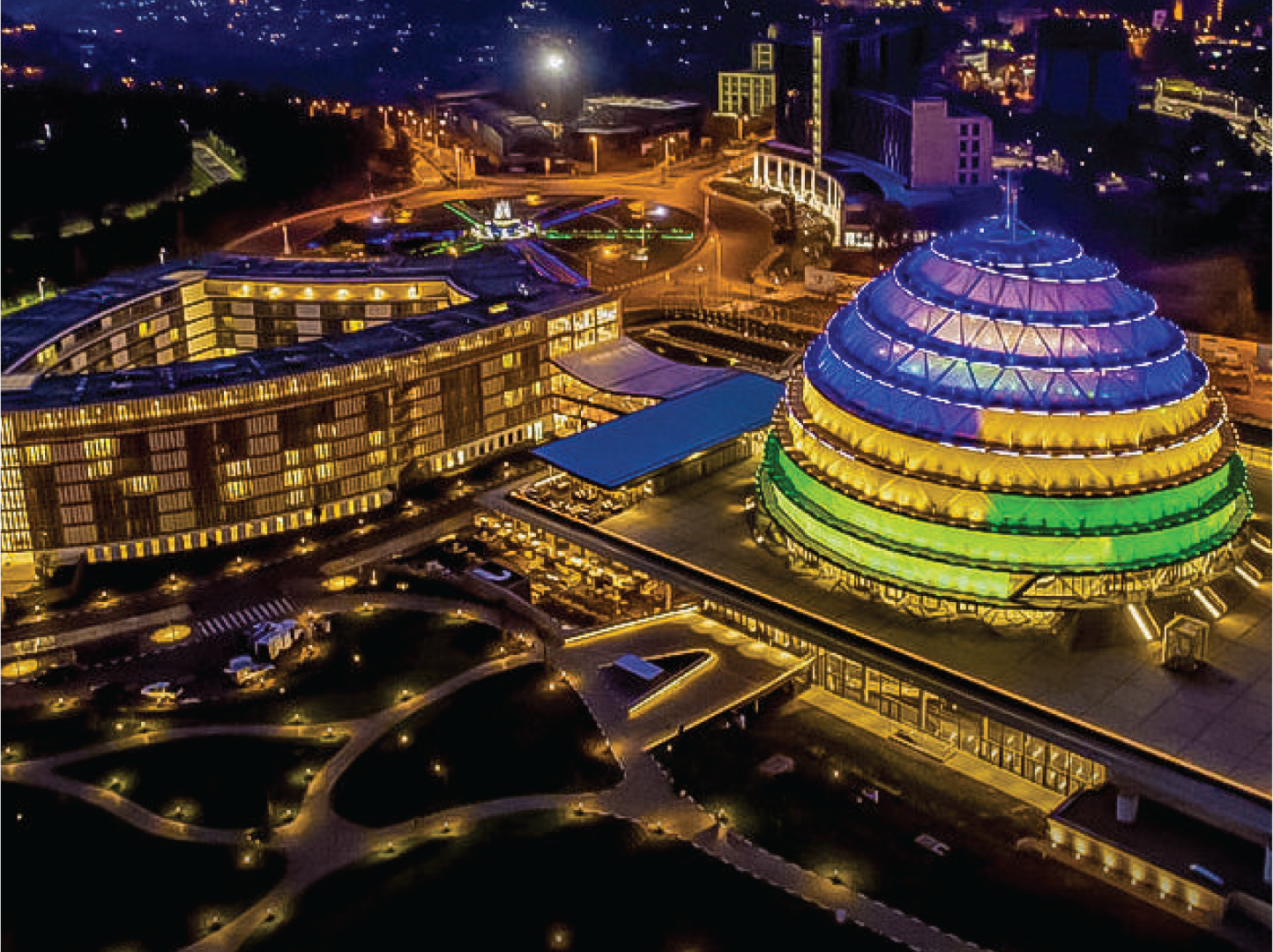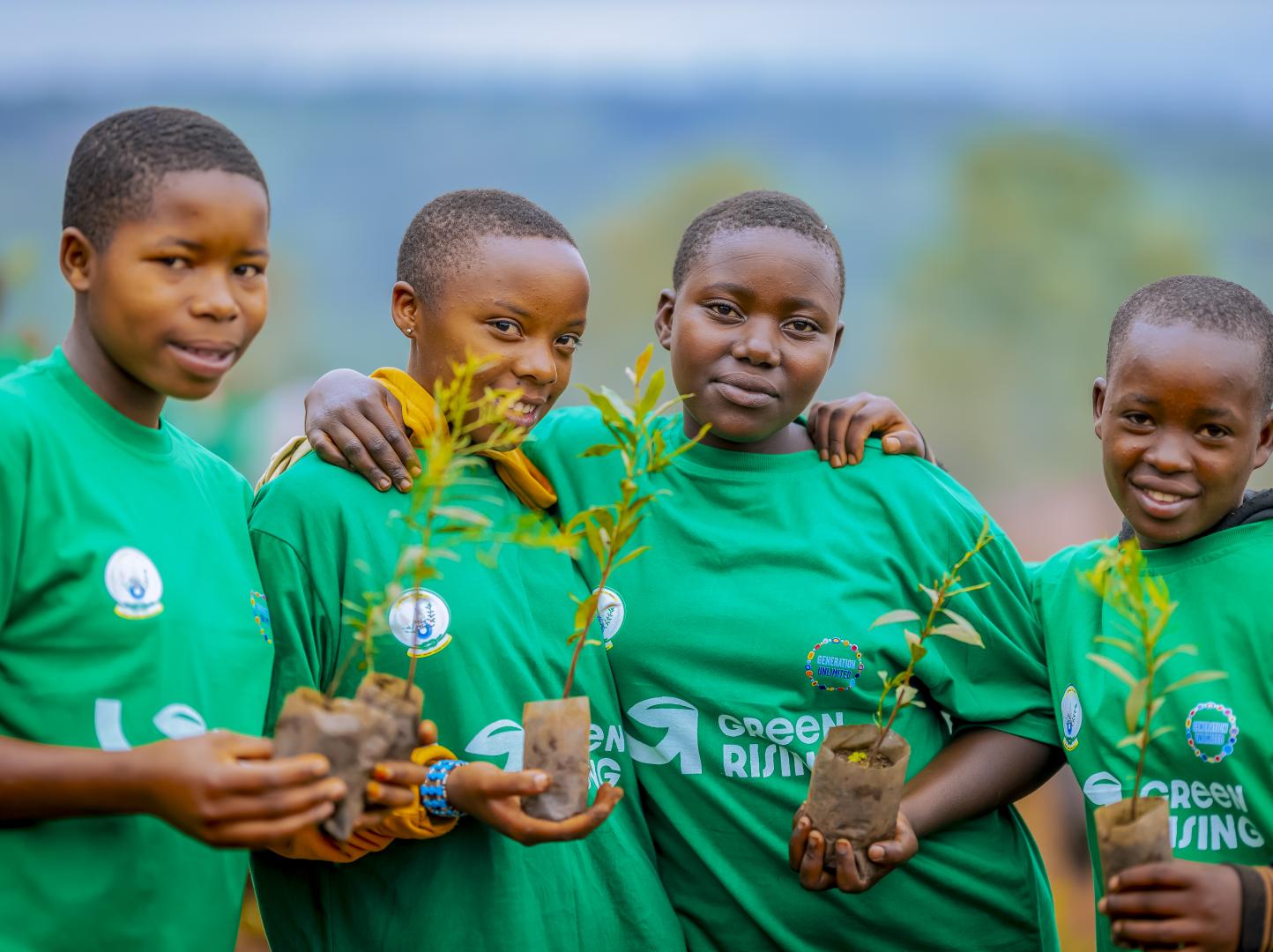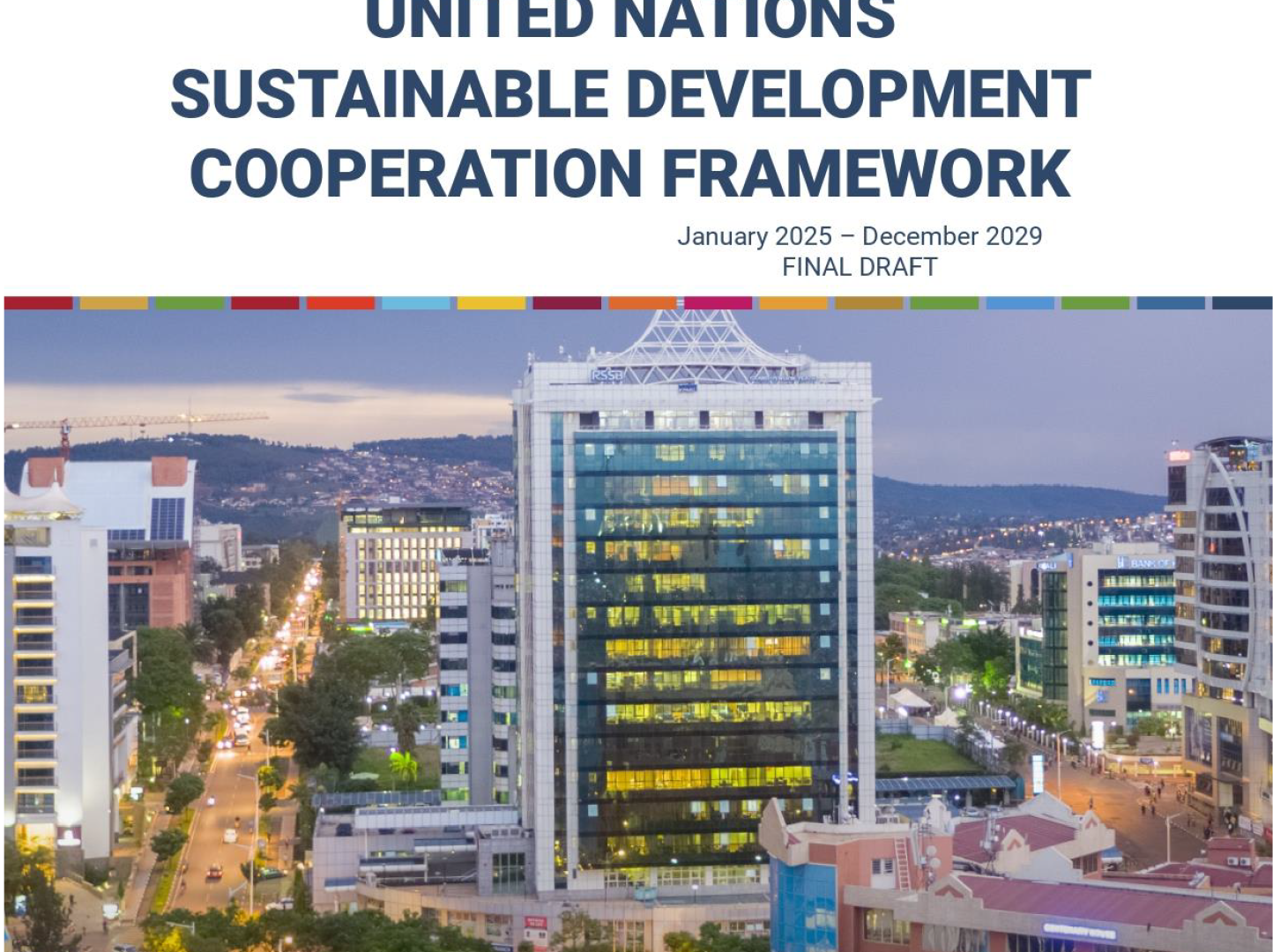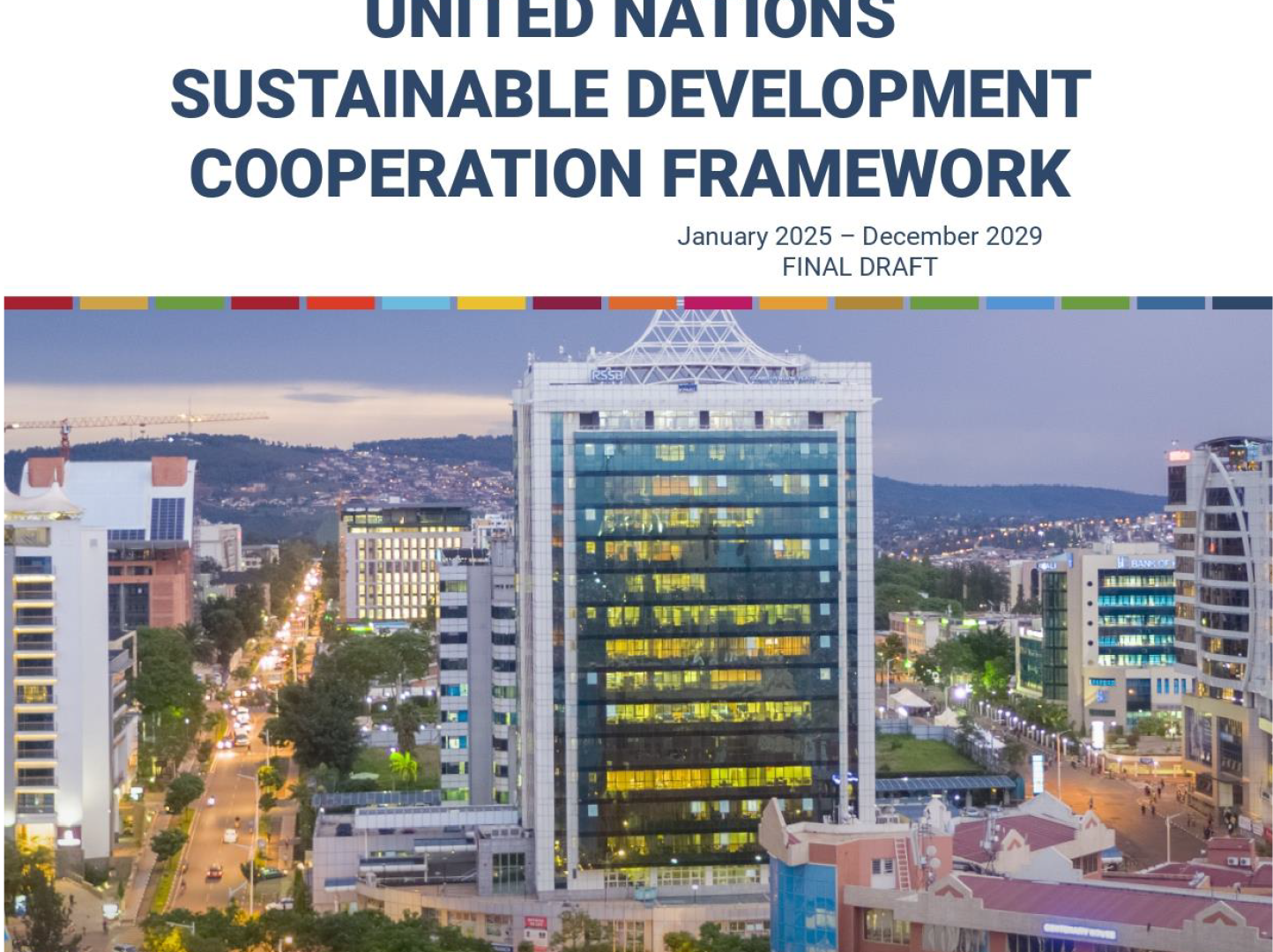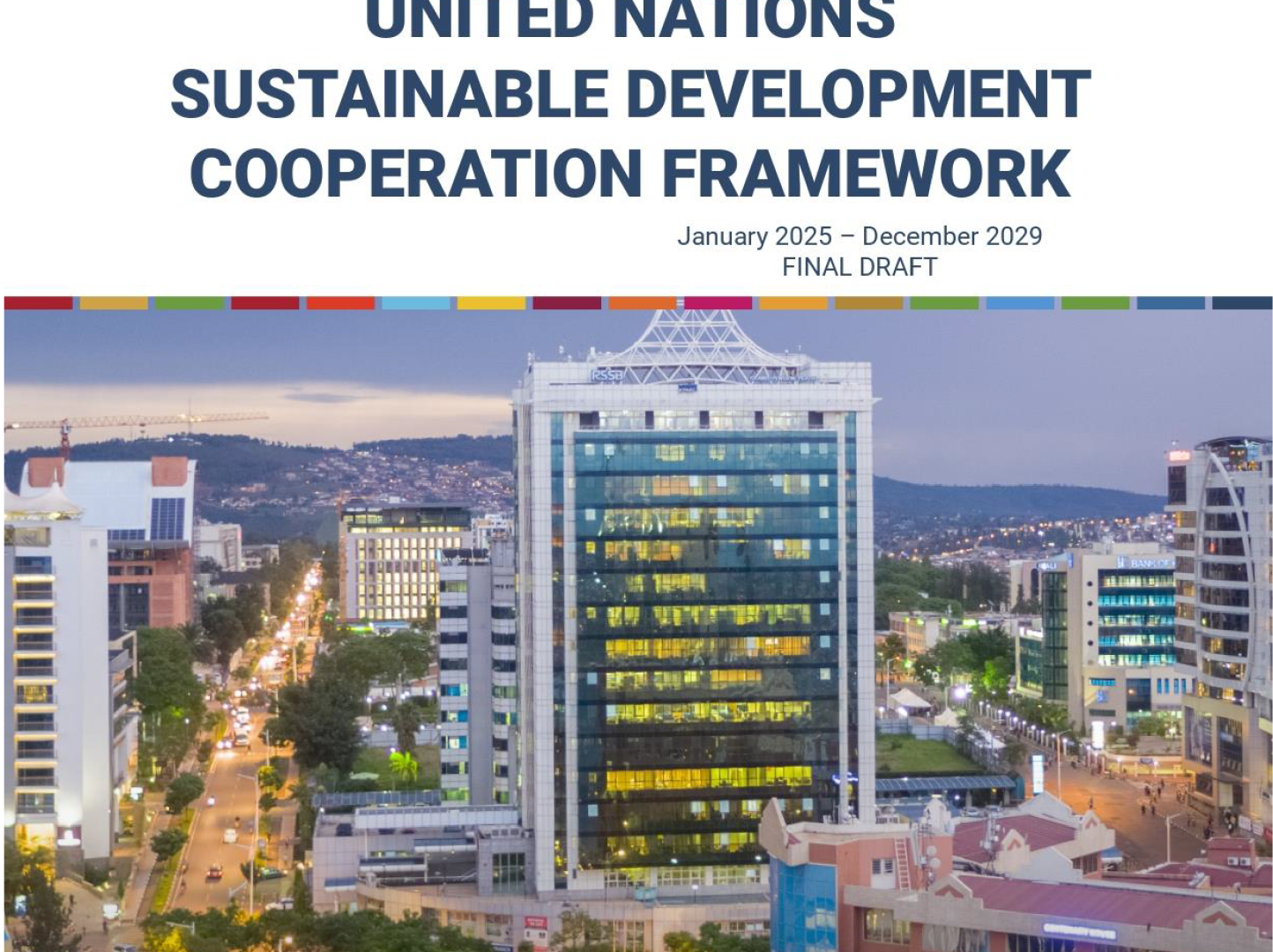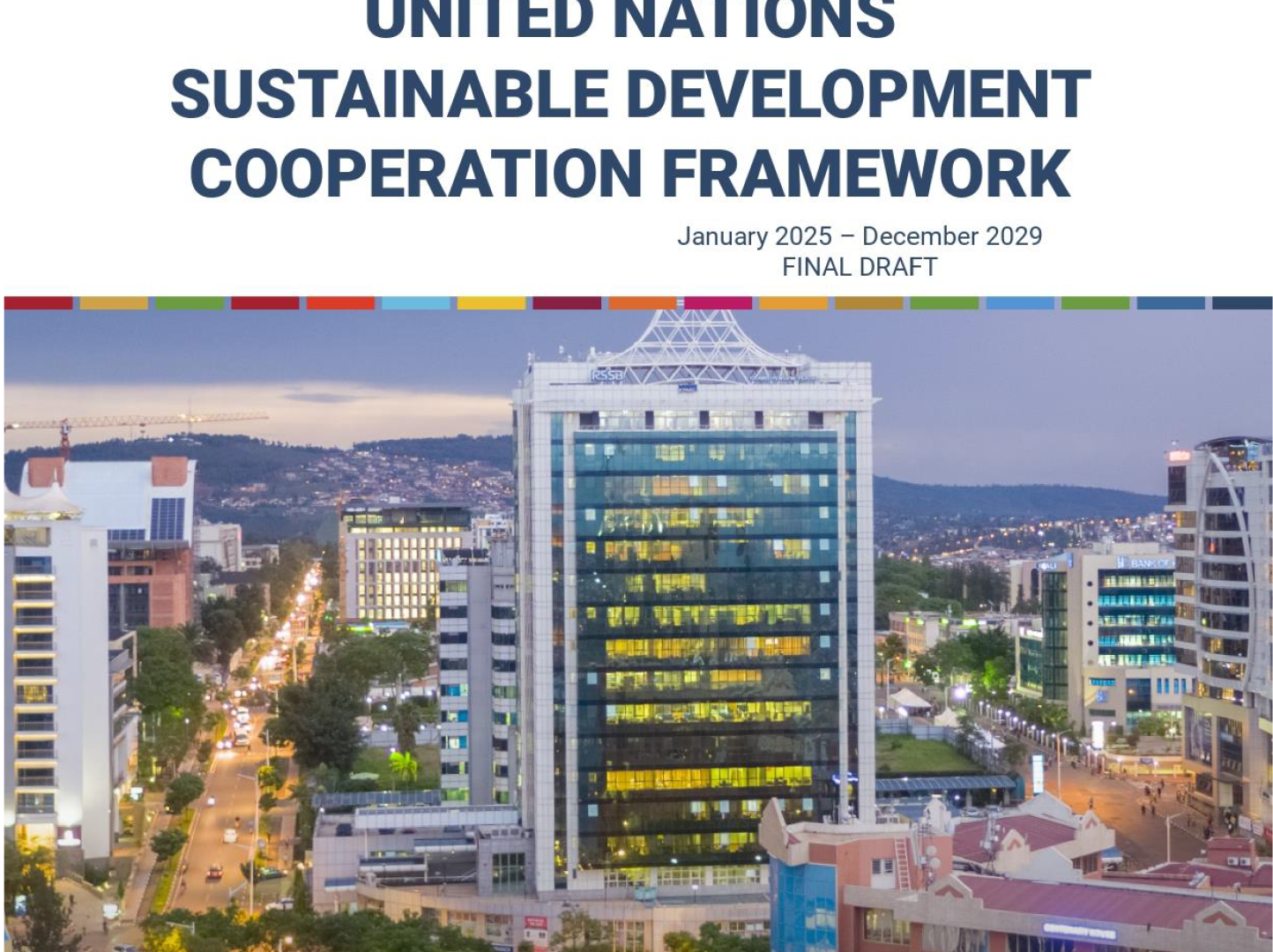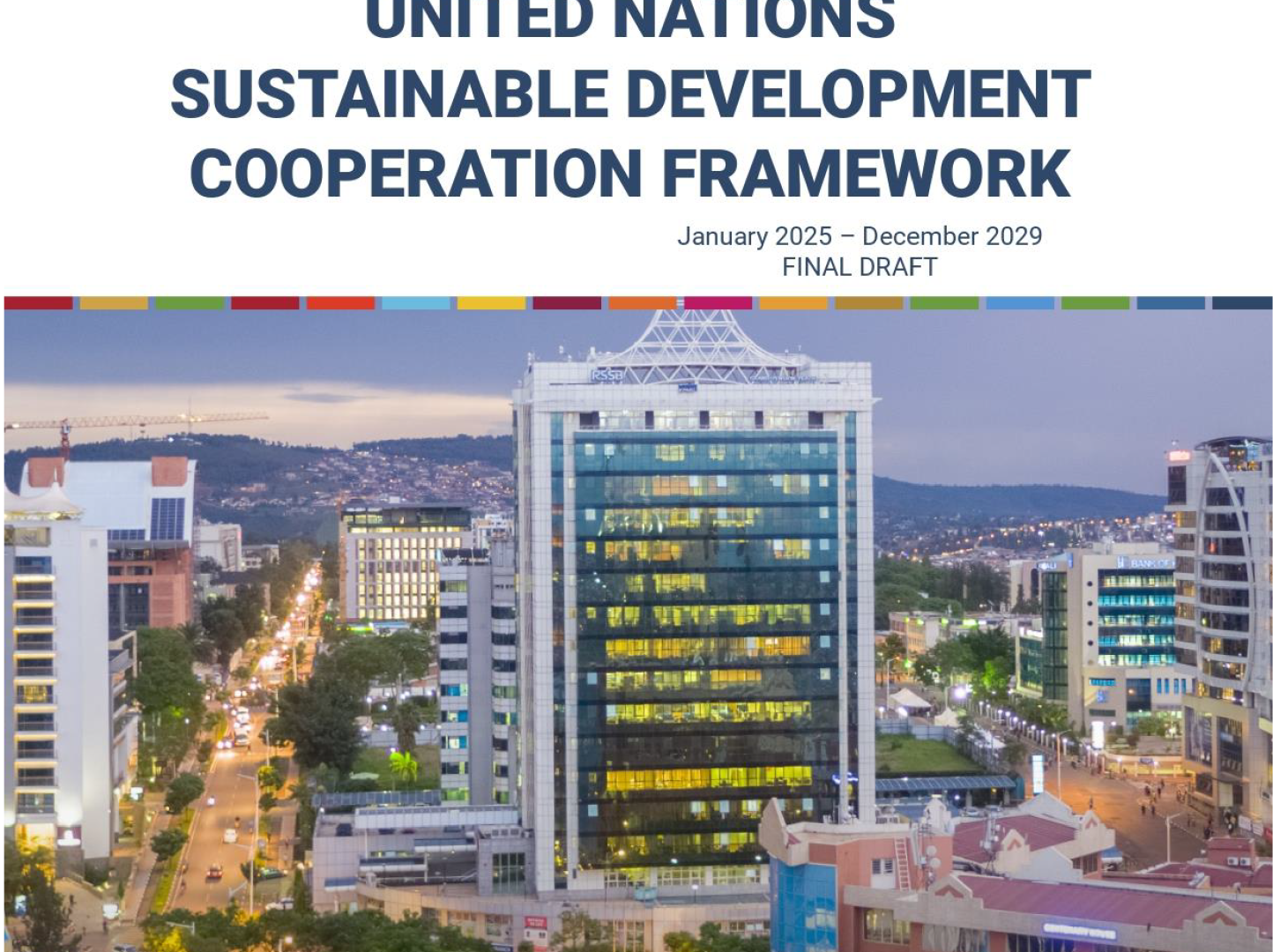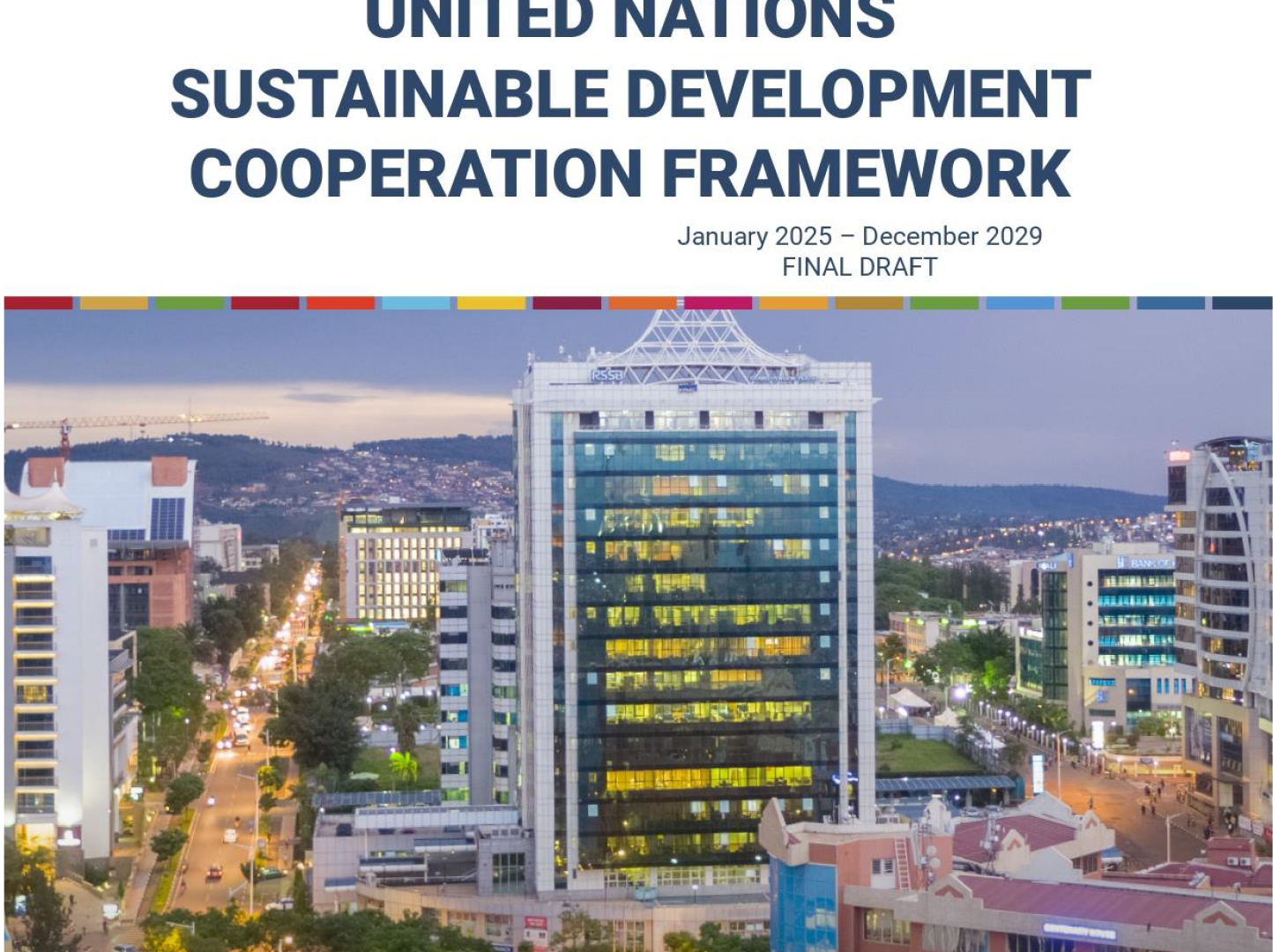Latest
Story
22 January 2026
Ambassadors of African countries in Kigali Push for a New Financing Architecture for Growth and Jobs on the continent
Learn more
Story
03 December 2025
Advancing Responsible Business: ESG & Corporate Sustainability Training Boosts Rwanda's Collective Journey Toward a Sustainable Future.
Learn more
Story
20 November 2025
UN Rwanda Unveils Five Flagship Investment Cases to Accelerate Rwanda’s Transformation Agenda
Learn more
Latest
The Sustainable Development Goals in Rwanda
The Sustainable Development Goals are a global call to action to end poverty, protect the earth’s environment and climate, and ensure that people everywhere can enjoy peace and prosperity. These are the goals the UN is working on in Rwanda:
Story
05 January 2024
Boukuru’s performance at Flytime Fest in Nigeria: A great steppingstone to her carrier
Christine Uwase Boukuru a young Rwanda vocalist found herself in Nigeria, ready to perform for the very first time in her career on the global scene. It was a dream come true for her, as she had always admired the vibrant music scene not only in Africa but on an international level.
As she stepped onto the stage, she couldn't help but feel a mix of nerves and excitement. Little did she know that she would be sharing the stage with big icons like the famous David Adedeji Adeleke OON, who is professionally known as Davido among others.
Boukuru’s performance in Nigeria was an immediate result emanating from the partnership between the government of Rwanda through the Ministry of Youth and Arts, Imbuto Foundation, and the United Nations in Rwanda to promote the creative industry.
“This was a dream come true and life-uplifting to me. I made a lot of connections and recorded three songs with Nigerian artists that will be released soon” the excited Boukuru narrated.
As the lights dimmed and the music began, she took a deep breath and let her voice soar. Her soulful melodies filled the air, captivating the audience from the very first note. The crowd was mesmerized by her unique blend of African rhythms and heartfelt lyrics, swaying to the beat and singing along.
The young artist's performance was met with thunderous applause and cheers. The audience recognized her raw talent and the authenticity she brought to her music. It was a proud moment for her, representing not only Rwanda but also the power of music to transcend borders and unite people from different cultures.
“Upcoming artists will always need opportunities like. We need to collaborate with other famous artists to grow our talents thank you the government of Rwanda and UN Rwanda for this opportunity I got”,
The experience had not only elevated her artistry but also broadened her horizons. She was now more inspired than ever to explore new sounds, collaborate with artists from diverse backgrounds, and use her music as a tool for positive change.
1 of 5

Story
21 December 2023
UN Day X Spaces: Delivering Equality, Justice and Freedom for Migrants
In marking the 79th Anniversary of the United Nations, International Organization for Migration (IOM) in Rwanda, the UN held a public Dialogue to shed light on the crucial role of delivering equality, justice, and freedom for individuals on the move. The Dialogue which took place on X space, stressed the importance of affording migrants equal access to services and opportunities, recognising their fundamental rights.
A notable example highlighted during the discussion was IOM's efforts in skills development through collaboration with the Rwandan diaspora living abroad. Individuals from the diaspora engage in short assignments in Rwanda, sharing their expertise to contribute to the skills development and knowledge transfer of the local population.
One example is Jean Claude. He moved to Belgium in 2006 to earn a Bachelor’s degree in Electronics. Upon completing the course, he quickly started a thriving career as a railway technology specialist. When 17 years into his Belgian chapter, Jean Claude heard about an opportunity to travel back to Rwanda to share his skills, he did not hesitate to sign up for the programme.
"Wherever Rwandans go, they are exposed to new technologies and knowledge. There is nobody better to bring it back to Rwanda than us."
The discourse on X space, underscored the significance of access to justice as a fundamental right for migrants, emphasizing its essential role as a prerequisite for the realisation of all other rights. This is particularly crucial in ensuring the labor rights of migrants from other countries are respected.
Moreover, the conversation acknowledged migration as an inherent expression of freedom. Rwanda's approach to managing migration was commended, citing policies and measures such as the registration of third national countries, open-visa policies, open-for-business policies, and free movement for East African Community (EAC) nationals. Notably, Rwanda was the first country to ratify the AU Free Movement Protocol of the AfCFTA, being one of only four countries to do so.
"Everybody deserves access to services, including migrants. While skills are widely distributed, opportunities are not," asserted Ash Carl, Chief of Mission for IOM Rwanda. "We work with Rwandans residing overseas to explore how they can transfer those skills back to their home country."
Migration is a cross-cutting issue in the 2030 Agenda, relevant to all of the Sustainable Development Goals (SDGs). Further, the SDG’s motto to “leave no one behind” is a clear call for sustainable development to be inclusive, including for migrants. At least ten out of 17 goals contain targets and indicators that are directly relevant to migration or mobility. Ensuring equality, justice, and freedom for migrants is not only a moral imperative but also a fundamental commitment to building inclusive societies, fostering global harmony, and unlocking the full potential of diverse contributions to collective progress.
1 of 5
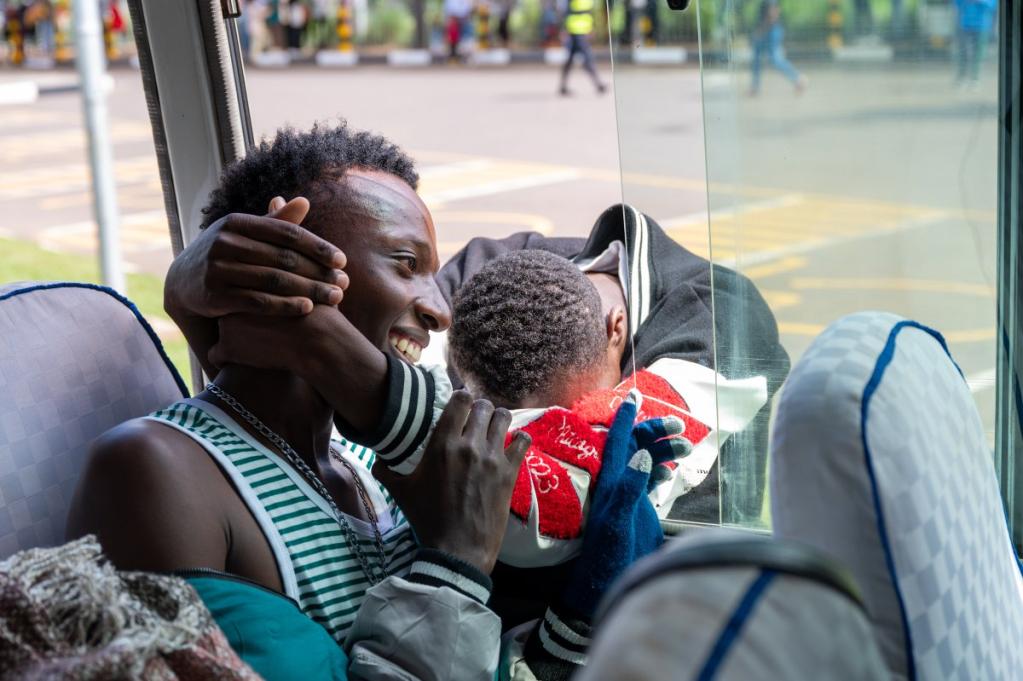
Story
20 December 2023
Fostering Creativity: Rwanda and Nigerian Creative Industry experts to forge strategic partnerships.
In alignment with Rwanda's dedicated commitment to nurturing its creative industry and empowering its youth, as underscored during the UN Deputy Secretary-General's visit to Art Rwanda Ubuhanzi on the sidelines of the 2022 Commonwealth Heads of Government Meeting in Kigali, a collaborative effort has been initiated. UN Rwanda, Imbuto Foundation, the Ministry of Youth and Arts, and the Ministry of National Unity and Civic Engagement (MINUBUMWE) are jointly shaping the 'Unleashing the Potential of Youth through Creative Industry in Rwanda' Joint Programme.
This comprehensive initiative aims to equip Rwandan youth with essential skills and knowledge to establish sustainable creative enterprises, promoting innovation, professionalism, and inclusivity within the creative economy.
Additionally, it seeks to foster collaboration and network-building between the creative industries of Rwanda and Nigeria. As a part of this initiative, Rwanda hosted a delegation of six experts from Nigeria to assess progress, opportunities, and challenges within the Culture and Creative Sector.
Rwandan and Nigerian creative industry experts are set to chart a new path to create a platform for collaboration and partnership in a new move to promote and strengthen the foundations of their respective creative landscapes.
The first step happened after the productive visit by Nigerian icons to Rwanda where they held several engagements with Rwandan government officials, United Nations Rwanda, and the local industry practitioners and experts.
This partnership will mark a significant step toward nurturing cross-cultural exchanges, promoting talent, and unleashing the untapped potential of the African creative sector that is envisaged to create more job opportunities, especially among the African youth.
Adebola Williams Chairperson of AWNetwork and founder of MITTA Centre who led the delegation of the Nigerian’s icons expressed the willingness and eagerness to strategize on the new channels to enhance partnership.
“This sector has a huge potential and we want to come up with a roadmap that will help either catalyze or accelerate the creative economy to create jobs for young people, to protect their Intellectual Property, to upskill their capacity, share knowledge, and build structures that help them be their most effective experts”, Adebola said.
According to Ozonnia Ojielo the UN Resident Coordinator in Rwanda, the impact of the partnership between the Rwandan and Nigerian creative industry sectors extends far beyond the realms of art and culture underlining that it has the potential to be a catalyst for economic development, cultural exchange, and the empowerment of a new generation of African creatives, ultimately reshaping perceptions and elevating the global standing of African creativity.
He further mentioned that nurturing emerging talent will empower young creatives in both nations. “I’m optimistic that expertise from experienced professionals will lead to the development of a highly skilled and innovative new generation within the creative industries and as United Nations in Rwanda, we will continue providing our support and ensure this vision is realized”,
In an exclusive interview with the Hon. Sandrine Umutoni State Minister for Youth, she noted that through strategic partnerships with different stakeholders and partners, the ministry has come up with initiatives that have positively impacted the young generation.
“We have been discussing with partners to come up with a good strategy on how to empower our young people both educated and not educated, especially through the creative industry. The creative economy has the potential to not only increase the GDP of the country or at a global level but also bring together young people around the massages of unity, and resilience”.
She cited ArtRwanda-Ubuhanzi a televised nationwide talent search project implemented by the Imbuto Foundation in collaboration with the Ministry of Youth since 2018. The project identifies and supports young and talented Rwandans within the creative arts industry in nine different categories (Film making, Photography, Digital Art, Acting and drama, Dance, Fashion Design, Music, Literature, Visual and Plastic Arts).
During the discussion, H.E Robert Masozera, Director General of Rwanda Cultural Heritage Academy welcomed the anticipated partnership adding that this will open new doors for Rwandan creative experts to the international heights.
“We want to expand Rwanda’s creative economy. We are excited about learning from these Nigerian experienced icons”, He noted.
The Ambassador further observed that Nigeria's creative sector is more developed adding that this was a great opportunity for the local industry to share experiences and learn from their Nigerian counterparts as this will move the Rwandan creative industry to another level.
The Nigerian icons and members of MITTA Centre Creative Experts Council who were in Rwanda include Bada Akintunde Johnson the Country Manager of Paramount Africa, Moses Babatope G.E.D. Film House Cinemas, Osas Ighodaro Actress and Producer, Richard Mofe Damijo Actor and Executive Producer, Cecil Hammond CEO of Flytime Group, and Adebola Williams Chairperson of AWNetwork who was leading the delegation.
As a direct outcome of the visit, the MITTA Centre extended an exclusive invitation to Ms. Christiane Bukuru Uwase, a talented Rwandan musician who engaged with the Nigerian Icons during their visit. She showcased her exceptional talents at the prestigious FLYTIME FEST 2023, which took place in Lagos from December 21st to December 26th, 2023.
This performance marked a historic moment as Ms. Bukuru became the first-ever Rwandan artist to grace the stage at Flytime Fest, representing a remarkable opportunity seized!
The creative economy contributes to the achievement of the broader objectives of the 2030 Agenda, with emphasis on the quality of life and well-being as a key outcome of a targeted economic process and It aligns with a variety of Sustainable Development Goals (SDGs), especially the quality education, gender equality, decent work and economic growth and Industry, Innovation, and infrastructure.
1 of 5
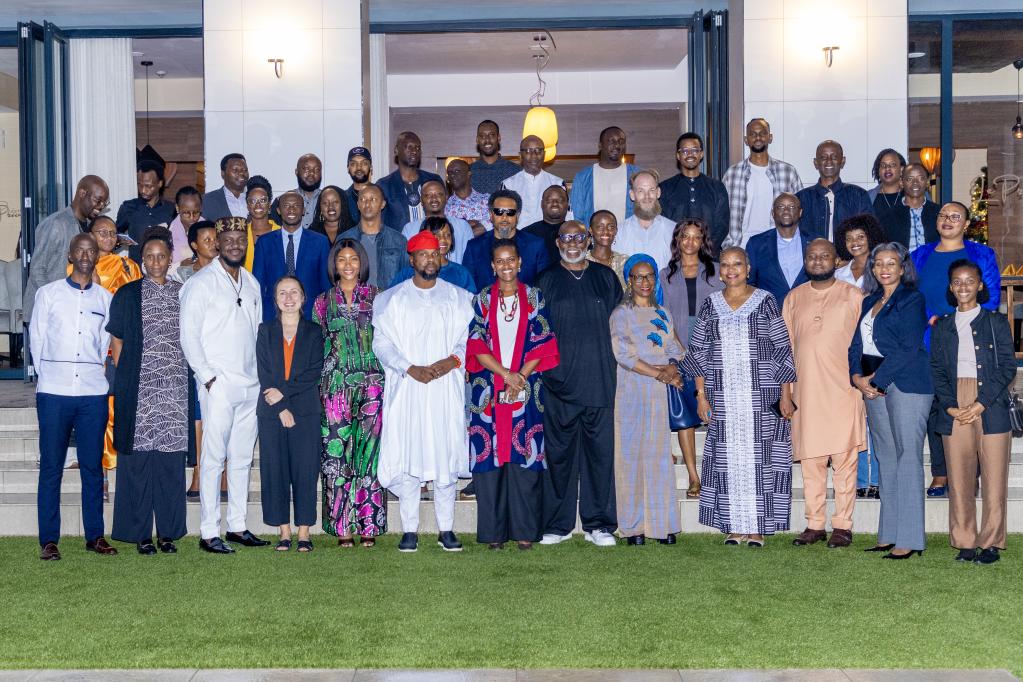
Story
15 December 2023
Government and One UN Rwanda assess the impact of collaborative efforts toward achieving the country’s development agenda
The Minister of Finance and Economic Planning Dr. Uzziel Ndagijimana and the United Nations Resident Coordinator to Rwanda Mr. Ozonnia Ojielo chaired the 2023 One UN Steering Committee to assess the impact of the joint efforts aimed at achieving the Rwanda development agenda.
The One UN Steering Committee Meeting is an essential time to review and reflect on the progress that the UN system has made in the implementation of the United Nations Development Assistance Plan Two (UNDAP II) which is fully aligned with the National Strategy for Transformation One (NST1).
The high-level gathering attracted government cabinet ministers from different sectors, Heads of UN Agencies in Rwanda, development partners, Civil society representatives, and Mr. Achim Steiner the UNDP Administrator who was on an official visit to Rwanda.
While officially opening the meeting, Minister Dr. Uzziel Ndagijimana underscored the significance of the meeting mentioning that it is a re-affirmation of the Government of Rwanda’s commitment to Delivering as One Initiative or the “One UN” as commonly referred to, since 2007 when Rwanda became among the eight pilot countries with the main objective of strengthening the effectiveness and coherence of the UN at the country level.
“The UN has been fully aligning its interventions with our medium to longer-term development strategies through the UNDAP with the Leadership of the UN Resident Coordinator. Today we have the opportunity to review, assess, and commit ourselves to act together with the main purpose of ensuring that the One UN becomes a reality in Rwanda which I am sure can be replicated elsewhere in the World”. He said.
Minister further mentioned that as the government focuses on achieving the targets in the remaining period of NST1 and preparation for the successor program “we will count on the UN’s collaboration in this Journey and I believe that our Meeting today is relevant for this reason”.
Through various agencies and the Resident Coordinator's office, the United Nations plays a crucial role in supporting Rwanda's socioeconomic development through a variety of programs and initiatives, especially in different areas like poverty reduction and economic development, health, education, youth, gender equality and women empowerment, environmental sustainability, and good governance among others.
The UNDP Administrator Mr. Achim Steiner who attended the conversation hailed Rwanda's resilience in advancing the country’s social-economic development and good governance pledging for more collaboration and support to the Country's development agenda.
“We feel very privileged as UNDP to have been a long-time companion to Rwanda in its various development phases and journeys that it has embarked on. UNDP has a very broad set of engagements across governance, the justice sector, and digital, but also green transitions and innovations. Very often, we are not just an institution that implements one programme. He said.
Participants discussed several key topics, including the upcoming new National Strategy for Transformation2, financing needs, boosting public and private, domestic and external financing, and the Future Drivers of Growth especially how development cooperation can support these growth drivers to accelerate their ability to contribute to Rwanda’s transformative agenda.
Mr. Ozonnia Ojielo the UN Resident Coordinator in Rwanda commended the government’s visionary leadership adding that it was indeed imperative for all partners to continue working together for the country to achieve its sustainable goals and development agenda.
“How do we move away from project focus to program focus? how do we give space to the development partners, civil society, and the government to collaborate and work together in the implementation of these decisions”.
1 of 5

Story
07 February 2024
Peace and Security at the table as regional countries convene under UNSAC
Creating and sustaining peace and security in the Great Lakes region of Africa involves a comprehensive and collaborative approach, addressing both immediate and underlying causes of conflicts. This was at the center of the discussion during the 56th Ministerial Meeting of the United Nations Standing Advisory Committee on Security Questions in Central Africa (UNSAC) hosted by Rwanda
The five-day gathering convened foreign ministers and experts from 11 member countries of the Economic Community of Central African States (ECCAS) to assess various topics focusing on security and stability issues in the region.
The United Nations Special Representative of the Secretary-General for Children and Armed Conflict (SRSG CAAC), Ms. Virginia Gamba, called on member countries to prioritize the issue of shielding children in conflicted areas as a vital aspect of human rights protection.
She further observed that while the UN plays a significant role, it's important to note that addressing the complex issue of child protection in conflict zones requires the cooperation of governments, non-governmental organizations (NGOs), and the international community as a whole.
“We need to have a regional plan on how to prevent violations, improve communications between borders, improve border controls, and improve how to handle children who are released from the conflicts so they can be reintegrated safely back into communities”, she said during the exclusive interview with the UNRCO communications team.
The UN Leader commended the meeting mentioning that though it was generally focusing on human rights protection, it was also a great opportunity to advocate for children suffering in the conflicted zones in the region particularly girls who are raped by terrorists and armed groups.
During this meeting, Rwanda was elected to chair the Bureau of the United Nations Standing Advisory Committee on Security Questions in Central Africa for the next 6 months.
In his remarks, Rwanda’s foreign affairs Minister H.E Vincent Biruta called for joint efforts to address regional security issues. He stated that Central Africa is facing numerous security threats, ranging from the problem of small arms to questions linked to migration crises, climate change, terrorism, extremism, and unconstitutional changes, among others.
Minister Biruta further emphasized the need to identify and adopt coherent strategies to counter all potential threats to the stability of the sub-region while reiterating Rwanda’s commitment to achieving the goal.
“I hope this meeting will give new impetus to the search for solutions to the security challenges facing our sub-region. I would also like to reiterate Rwanda's willingness to work with each of you to achieve this goal,” he highlighted.
UNSAC was established on 28 May 1992 by the Secretary-General of the United Nations, under Resolution 46/37 B adopted on 6 December 1991 by the UN General Assembly. The decision was to have a positive response to the request made on 28 November 1986 by the member countries of the Economic Community of Central African States (ECCAS) emphasizing the need to create this Committee
🎥🔴 Link to the interview: https://www.youtube.com/watch?v=sKXtLf8NZrg&ab_channel=OneUNRwanda
1 of 5
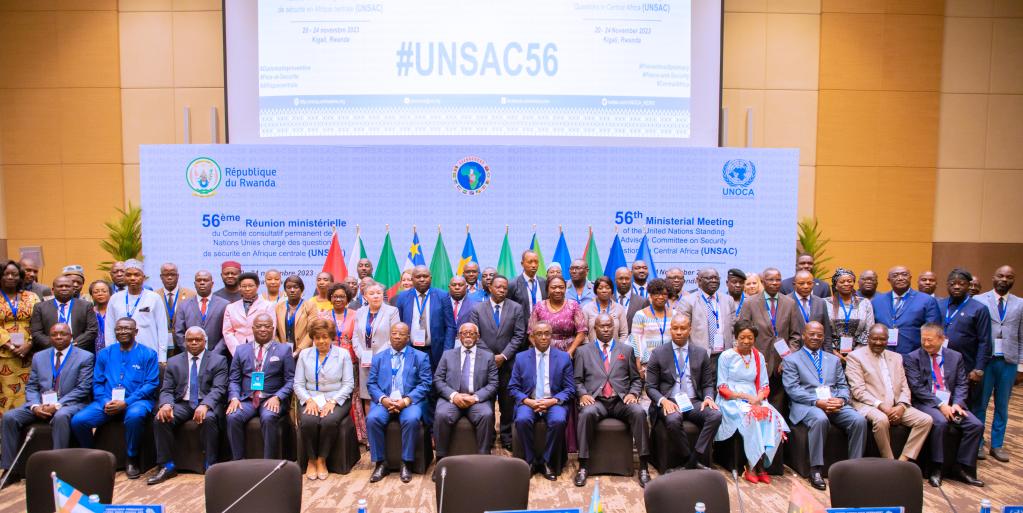
Story
22 January 2026
Ambassadors of African countries in Kigali Push for a New Financing Architecture for Growth and Jobs on the continent
At the Africa CEO Forum in 2024, a striking question echoed across boardrooms and policy circles: Is Africa on the menu, on the table, or should it build its own table? The metaphor captured a growing continental awakening. In a world where global financial decisions are largely made elsewhere, Africa’s development priorities too often remain shaped by systems not designed in its interest.That question resurfaced powerfully in Kigali on Friday, as African Ambassadors, senior United Nations officials, and business leaders convened for the Africa Strategic Investment Alliance (ASIA) Ambassadors’ Roundtable. Their message was clear: Africa’s time has come not only to sit at global tables, but to design its own—by building a financing architecture that serves its enterprises, its youth, and its future.The high-level dialogue brought together diplomats accredited to Rwanda, the UN system, and the leadership of AeTrade Group and Africa Strategic Investment Alliance (ASIA) to confront a structural reality. While global assets now exceed USD 420 trillion, less than four per cent are invested in developing economies. For Africa, this imbalance has produced a chronic MSME financing gap of more than USD 300 billion annually, leaving the vast majority of small businesses excluded from formal credit and unable to scale under the African Continental Free Trade Area (AfCFTA).Opening the meeting, United Nations Resident Coordinator in Rwanda Dr. Ozonnia Ojielo noted that Africa’s development challenge is not a lack of ideas, talent, or markets, but a global financing system that misprices African risk and underinvests in its productive sectors.“The future of development will be determined not by who provides financing, but by how financing is structured and deployed,” he said, calling for innovative partnerships between governments, continental institutions, the UN, and the private sector to align trade, finance, and logistics for large-scale job creation.At the centre of the discussions was the ASIA: a new African-owned platform designed to mobilise, deploy, and recycle capital for MSMEs, with a focus on youth and women, and to translate AfCFTA and Agenda 2063 commitments into bankable investment and enterprise growth.During the meeting AeTrade Group CEO Mr. Mulualem Syoum announced the appointment of H.E. Dr. Monique Nsanzabaganwa, former Deputy Chairperson of the African Union Commission and former Deputy Governor of the National Bank of Rwanda, as Chairperson of ASIA. He described the Alliance as a practical continental financing architecture, built to move Africa from fragmented interventions to coordinated, scalable solutions.In her keynote address, Dr. Nsanzabaganwa framed ASIA as Africa’s strategic response to a global investment paradox: abundant capital worldwide, but limited, expensive, and short-term financing for African businesses.“Global finance is not neutral. It is structured to favour mature markets and low-risk environments,” she said. “If Africa is to industrialise, create jobs and trade with itself under AfCFTA, it must build institutions that mobilise patient capital for productive enterprise, not speculation.”She outlined ASIA’s three pillars: financing the real economy, placing women and youth at the centre of transformation, and building strong, credible institutions capable of turning ambition into measurable impact. Member States, she stressed, are being invited to join not as beneficiaries, but as co-owners shaping governance, capitalisation, and strategic direction.The Roundtable reviewed ASIA’s roadmap toward full operationalisation in 2026, including the establishment of its headquarters in Rwanda, regional hubs in Ethiopia and Eswatini, and a three-country pilot to roll out short-term, cash-flow-based digital financing for MSMEs through a revolving capital model. By recycling funds several times a year, the model aims to dramatically expand reach while reducing reliance on sovereign borrowing and traditional aid.ASIA will be anchored in AeTrade Group’s integrated digital ecosystem, linking finance, logistics, payments, and market access platforms such as Sokokuu. Africa to enable African enterprises to trade, scale, and compete across borders.Ambassadors welcomed the initiative and engaged in governance, risk management, AfCFTA alignment, and concrete delivery for women and youth as entrepreneurs. Several countries expressed early interest in founding membership and bilateral follow-up.Closing the session, H.E. Doudou Sow, Ambassador of Senegal and Dean of the African Ambassadors in Rwanda, urged colleagues to brief their capitals and consider formal commitments, noting that Africa’s MSME financing gap is structural and cannot be closed by external instruments alone.Building on the question posed at the 2024 Africa CEO Forum, “menu, table, or own table,e” this conversation provided a strategic platform for reflection and debate. As global financing architectures continue to evolve in ways that insufficiently serve Africa’s development and integration ambitions, the continent is increasingly determined to design and anchor its own solutions. Africa’s pivot is not about disengaging from the global system, but about engaging it on stronger, more equal terms through institutions, capital, and policy frameworks conceived, governed, and driven by Africa, for Africa.
1 of 5

Story
03 December 2025
Advancing Responsible Business: ESG & Corporate Sustainability Training Boosts Rwanda's Collective Journey Toward a Sustainable Future.
The journey of Rwanda toward sustainable, inclusive and resilient growth continues to accelerate, with the private sector taking center stage. As global markets increasingly embrace responsible business practices, Environmental, Social and Governance standards have become a defining marker of competitiveness, trust and long-term value creation. Rwandan businesses therefore face an urgent imperative to strengthen their sustainability practices and align with emerging global frameworks and standards.To further support this movement, the UN Global Compact brought together business leaders in Rwanda for a full-day ESG & Corporate Sustainability Training, equipping companies with practical means of embedding ESG principles into strategies and operations. The training reaffirmed a powerful truth: sustainability is more than a requirement—it is a collective responsibility.Embed ESG for People-Centered, Planet-Friendly GrowthInterest in sustainability and responsible business conduct is growing fast, with 30 Rwandan organizations already part of the UN Global Compact Network. Anchored in Rwanda's Vision 2050 and the green growth agenda, the training guided participants through concrete field applications of ESG and helped them to shift their perspective from compliance toward value creation.Speaking at the opening, Marie Claire Dushimumukiza, Country Manager at UN Global Compact in Rwanda, highlighted the need to empower local businesses with practical ESG skills: "The private sector in Rwanda demonstrates great leadership when it comes to embracing sustainability. This training is not just about understanding ESG, but also about how to equip companies to integrate these principles into daily decision-making and long-term strategy. When businesses grow responsibly, entire communities benefit and together we move closer to the future we want." Marie Claire DushimumukizaThe training was practically oriented and took participants through a complete learning curve, starting with an introduction to Rwanda's priorities in sustainability and the place of ESG in national development. Participants learned about the basics of ESG standards, how to integrate ESG into business strategy and governance, and major global frameworks and disclosure requirements, including the UN Global Compact Communication on Progress (CoP). The workshop also included practical demonstrations of tools and resources that will enable companies to carry out materiality assessments and navigate ESG learning platforms. The day concluded with a dynamic peer exchange in which participants shared lessons, challenges, and success stories from their respective sectors, allowing time for real-world reflection and collaborative learning. These sessions combined expert insights, case studies, and open discussions, enabling participants to explore operational realities and sector-specific needs while gaining clarity on effective ESG implementation and sustainability reporting. “As we begin today, I encourage you to connect with new colleagues, as strong networks strengthen good business. The focus on ESG by your organization reflects a global shift that every sector must now embrace. From agriculture to finance, companies with good ESG practices are proving more resilient, trusted and competitive. ESG is no longer about simple responsible investing but is a framework for modern business. It is no longer optional; it is the foundation for long-term survival and sustainable growth.” — Lead Facilitator, Gitau Wamukui. What Participants Learned: Emerging Outcomes from the Training Participants highlighted that the training enabled them to clearly identify the right ESG metrics and understand how broader sustainability ambitions can be translated into actionable, concrete steps. Many noted that they now feel more confident about how to begin implementing ESG within their organizations—emphasizing that the best moment to start is now. They also gained clarity on selecting material issues relevant to their companies and on setting SMART goals that are both realistic and achievable. Others pointed out that these sessions equipped them with basic skills in developing an ESG strategy aligned with their sector and encouraged review of their organizational profile through the ESG lens. A number of participants indicated that the training strengthened their understanding of ESG as a driver of business resilience, competitiveness, and long-term value creation. They also recognized the importance of preparing a sustainability report—through the UN Global Compact Communication on Progress—as a tool for transparency, stakeholder trust, and alignment with global standards. The sessions clarified the difference between sustainability as the “why” and ESG as the “how,” including how ESG differs from traditional CSR. They also highlighted the UN Global Compact Communication on Progress as a practical, structured framework for credible ESG reporting aligned with the Ten Principles. Participants noted clear intentions to apply these lessons in programme design, reporting, and daily operations. Overall, the reflections demonstrate a growing maturity in Rwanda’s private sector, which now increasingly recognizes both the business value and ethical responsibility of strong ESG practices and the strategic importance of using the Communication on Progress to strengthen governance, transparency, and meaningful sustainability performance.
1 of 5
Story
20 November 2025
UN Rwanda Unveils Five Flagship Investment Cases to Accelerate Rwanda’s Transformation Agenda
On 20th November 2025, the United Nations in Rwanda, convened development finance institutions, bilateral partners, the private sector, and philanthropic organisations for a High-Level Partner Roundtable showcasing five flagship Joint Programmes (JPs) designed as investment-ready propositions for Rwanda’s next generation of development solutions. The event marked a significant shift in how the UN Country Team operates under the new Cooperation Framework (2025–2029)—moving from fragmented projects to integrated, scalable, and co-financed initiatives aligned with Rwanda’s National Strategy for Transformation 2.Guided by the leadership of the UN Resident Coordinator, Dr. Ozonnia Ojielo, and the UNCT’s Programme Management Team, the five Joint Programmes were presented as bankable investment cases with clear financing pathways, measurable impact metrics, and strong national ownership. Stakeholders welcomed this new direction, commending the UN’s effort to move “from funding to financing development,” unlocking partnerships and capital flows needed to advance the achievement of the Sustainable Development Goals in Rwanda.“Rwanda aspires to be an upper-middle-income country by 2035 and a high-income economy by 2050. These ambitions require new, innovative ways of working, and given today’s complex development challenges, our collective offer as the United Nations is to help mobilise the right partnerships, capital, and capabilities to drive transformative impact through an innovative blended finance approach, said Ozonnia Ojielo, UN Resident Coordinator. The five new Joint Programmes presented today span Climate Action, Digitalisation, Health, Livestock Development, and Peace & Governance.Accelerating Climate Action and Clean Cooking (ACACIA)Co-led by WFP and UNEP, ACACIA offers a transformative pathway to reduce Rwanda’s heavy reliance on polluting cooking fuels while driving climate mitigation, health benefits, and economic opportunity. With 92% of households dependent on biomass and 7,400 annual premature deaths from household air pollution, ACACIA proposes a blended-finance architecture combining carbon revenues, risk-sharing instruments, and market development to unlock large-scale adoption of clean cooking. Its investment case positions Rwanda as a continental leader in climate-resilient, low-emission household energy systems.Digitalisation, Data and Innovation for Inclusive DevelopmentCo-led by UNDP and ITU, this JP aims to revolutionise Rwanda’s agriculture sector using digital platforms, data systems, and innovation. With agriculture employing 70% of the population, the programme will connect 1.5 million farmers, digitise 500 cooperatives, and deploy 100 solar-powered digital hubs offering market information, cold storage, processing tools, and fintech-enabled financial inclusion. Through a phased approach, it blends grants, PPPs, and impact investment to strengthen value chains, cut post-harvest losses by 30%, and create 5,000 agri-tech jobs—ensuring no farmer is left behind in the digital era.Integrated, Quality and People-Centred Primary Health CareCo-led by UNICEF and UNFPA, this programme aims to upgrade 420 health posts by 2029, addressing gaps in energy, digital connectivity, equipment, and service quality. Through climate financing, development impact bonds, and de-risked investment instruments, the JP seeks to equip, electrify, and digitise health posts—facilitating improved service delivery, reducing operational vulnerabilities, and strengthening Rwanda’s primary health care backbone. Its impact includes 84,000 tons of CO₂ avoided and enhanced access to quality care for millions.Livestock Value Chain Development for Economic Transformation (LVC-DET)Co-led by UNDP and FAO, this JP targets the modernisation of Rwanda’s pig and poultry value chains—areas with strong domestic demand but limited productivity. By expanding infrastructure, lowering feed costs through innovation, and deploying blended finance for SMEs, the programme aims to support 8,000 women and youth-led enterprises, create over 1,000 jobs, and boost productivity by up to 30%. With an expected IRR of 15–18%, LVC-DET positions livestock as a competitive engine for nutrition, exports, and inclusive rural growth.PEARL – Peace, Equity, Accountability, Resilience, and LeadershipCo-led by UNDP and IOM, the Joint Programme is anchored in good governance and stability. PEARL focuses on strengthening peace, security, civic engagement, and digital governance. It responds to challenges such as regional instability, rising cybercrime, limited civic participation, and digital exclusion. Through AI-enabled early warning systems, citizen-driven digital platforms, anti–hate speech mechanisms, and cross-border peacebuilding initiatives, the programme seeks to promote national unity and trust in public institutions. With a total cost of USD 15 million and an anticipated ROI of USD 60 million, PEARL positions governance as the foundation for socioeconomic transformation.“These Programmes are truly fascinating. Deep appreciation to the UN team for putting all of this together. By exploring partnerships and bringing our efforts together, we can effectively support Rwanda’s development priorities,” said Martina Fors Mohlin, Head of Development Cooperation and Deputy Head of Mission at the Swedish Embassy in Rwanda.A New Era of Partnerships and Financing for Development“We are in the business of advancing the Sustainable Development Goals — together. Among the more than 8 million Rwandans we connect through our telecommunications services are farmers, traders, women, and men who stand to benefit directly from the programmes you have presented. We bring practical solutions to the table, and by working in partnership, we can unlock even greater impact for the people we serve. The challenges that exist are not barriers; they are opportunities we can jointly address as policy influencers,” said Somdev Sen, Chief Consumer and Digital Officer.“At I&M Bank, Corporate Social Investment is a top priority. We are already partnering with the United Nations across key sectors such as health and agriculture, and all the Joint Programmes presented today are strong and compelling. What is needed now is action. We should not wait — even small, incremental steps will move us toward meaningful impact. I particularly appreciate that these initiatives have been framed as investment cases, with clear returns on investment,” said Henry Chinedu Obike, Chief Innovation Officer at I&M Bank Rwanda Plc.“One year in Rwanda, and we have already witnessed the country’s visionary leadership, which is truly remarkable. With the UN’s shift from funding to financing development, we have a unique opportunity to make all national priorities achievable. This event was both highly important and insightful,” said Bob Junker, Head of Cooperation at the Embassy of Luxembourg in Kigali.From Member States and Cooperation Partners to Private Sector leaders, the High-Level Partner Roundtable demonstrated a shared commitment to doing things differently: collaborating more closely, breaking down silos, and navigating the rapidly evolving landscape of development finance with innovation.The dialogue was rich, forward-looking, and anchored in a collective ambition. Partners voiced strong alignment with the UN’s integrated approach and a readiness to co-invest in Rwanda’s transformation priorities. This marks a pivotal milestone in repositioning the UN as a strategic broker—mobilising capital, forging partnerships, and driving systemic solutions rather than implementing isolated initiatives.As Rwanda advances toward Vision 2050, the five flagship Joint Programmes showcase how innovative financing, digital transformation, climate action, peacebuilding, and robust governance can converge to deliver high-impact and sustainable development outcomes.By working together as One UN, we can leverage our collective strengths to advance sustainable development financing and deliver meaningful results. Our shared efforts are contributing to shape a more inclusive and resilient future for Rwanda—ensuring that progress reaches everyone and that no one is left behind.”
1 of 5
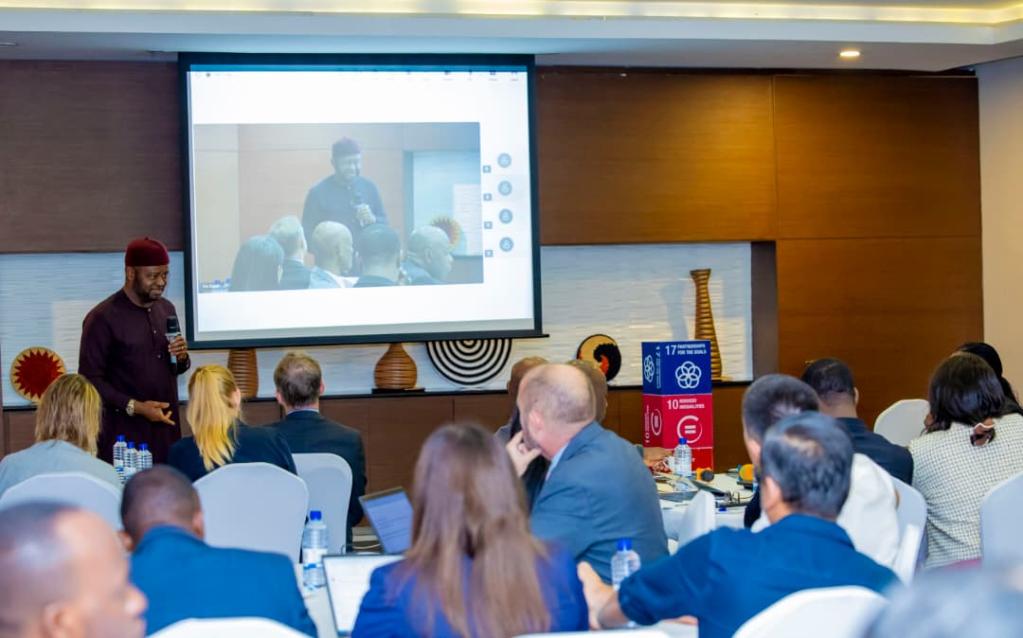
Story
14 October 2025
At #AHTS2025, the UN and partners explored ways to champion innovation and blended finance to accelerate Universal Health Coverage in Rwanda
Kigali, 14 October 2025 — At the Africa Health Tech Summit held in Kigali, United Nations agencies, government representatives, innovators, and private sector partners reaffirmed their joint commitment to accelerating progress toward Universal Health Coverage (UHC) through innovation, collaboration, and smart financing.Under the theme “Delivering as One: Scaling Innovations towards Universal Health Coverage,” the high-level session — convened by the UN Resident Coordinator’s Office in Rwanda, with UNFPA, UNDP, WHO, and FAO — brought together leaders from government, the UN system, civil society, and the private sector to showcase how integrated solutions are transforming Rwanda’s health landscape.Speaking at the session, Prof. Ozonnia Ojielo, the UN Resident Coordinator in Rwanda, highlighted that the country continues to stand as a compelling example of what aligned partnerships can achieve. “Through innovative projects and programmes implemented in close partnership with the Government of Rwanda, we are directly addressing bottlenecks in the health sector and accelerating progress toward the Sustainable Development Goals,” he noted. The dialogue underscored that achieving UHC requires more than isolated pilots or fragmented digital tools — it demands strategic alignment, where government leadership, UN system support, local innovation, and private capital move together with purpose. Rwanda is demonstrating what this alignment looks like in practice: The Government is setting a clear vision and digital health architecture;UN agencies are combining their expertise through a joint Delivering as One approach;Local innovators are building context-fit solutions using AI, telehealth, and data intelligence;And financial institutions are stepping in to scale what works.Panelists showcased how collaboration between the UN and the Government of Rwanda is unlocking new opportunities in digital health infrastructure and innovation. Examples included the establishment of the National Health Intelligence Center, youth-led startups supported through the timbuktoo HealthTech Hub, and the expansion of community health facilities through innovative financing models such as the UN Joint Programme on 1000 Health Posts.Highlighting the importance of private sector engagement, Benjamin Mutimura, Chief Executive Officer of I&M Bank Rwanda, said:“As a country of a thousand hills, Rwanda’s ambition to establish a thousand health posts is both symbolic and strategic. Through the UN Joint Programme on 1000 Health Posts, we are not only expanding access to primary healthcare — we are investing in the nation’s productivity and resilience. At I&M Bank, we believe that investing in health isn’t charity; it’s smart business. A healthy population drives innovation, fuels economic growth, and strengthens the foundation of sustainable development. That’s why the private sector must see health as a shared investment in the future prosperity of our country.” Through this Joint Programme — led by UNFPA and supported by six UN agencies — public-private partnerships, including I&M Bank, are enabling nurses to access financing to run community health posts, ensuring that quality healthcare is available close to home, 24/7.While delivering his keynote remarks, Dr. Muhammed Semakula, Permanent Secretary at the Ministry of Health said "Rwanda’s journey toward Universal Health Coverage is driven by collaboration, innovation, and strategic investment. By aligning government leadership with UN expertise, local innovation, and private sector support, we are building a health system that is inclusive, resilient, and ready to scale." The session concluded with an understanding among participants that Rwanda’s ecosystem for health innovation is well-prepared for scale-up. Delegates noted that the necessary infrastructure is already in place, supported by an enabling policy environment and strong partnerships between government, the UN, innovators, and the private sector. Discussions emphasized the need to move beyond pilot initiatives and transition toward investment-grade scaling, ensuring that digital health solutions promote inclusion and equitable access alongside efficiency.
1 of 5

Story
02 October 2025
Rwanda Reflects on Sevilla Outcomes: Moving from Global Frameworks to Local Financing Action
Kigali, 2 October 2025 — Ambassadors and High Commissioners accredited in Rwanda, Cooperation Partners, and senior Government officials convened to reflect on the implications of the outcomes of the Fourth International Conference on Financing for Development (FFD4) for Rwanda’s next phase of economic transformation.Organized by the UN Resident Coordinator’s Office, the briefing explored how the Sevilla Commitment — adopted in Spain earlier this year — can be translated into practical measures for mobilizing finance, managing debt, and strengthening cooperation at the national level.A New Global Compact Opening the dialogue, UN Resident Coordinator Ozonnia Ojielo described the Sevilla conference as a pivotal moment for rebuilding trust in multilateralism and collective problem-solving.“FFD4 marked a turning point for multilateralism and global cooperation,” he said. “The Sevilla Commitment provides a roadmap for a fairer, more inclusive financial system — one that can deliver financing at scale for sustainable development. For Rwanda, the message from Sevilla is clear: the time for commitments has passed; we must move from frameworks to financing, from vision to action.”The conference in Sevilla brought together more than 15,000 participants — including 48 Heads of State and 224 ministers — to address the persistent global financing gap for the Sustainable Development Goals, estimated at $4 trillion annually.Rwanda’s Take: Turning Global Lessons -- Local Strategy Grace Nyinawumuntu, Director General for Europe, Americas & International Organizations at the Ministry of Foreign Affairs and International Cooperation (MINAFFET), emphasized how the outcomes of Sevilla resonate strongly with Rwanda’s development priorities.“In Sevilla, the global community faced a tough reality — how to achieve the SDGs with such a vast financing gap,” she noted. “The conference concluded with two major outcomes: the Sevilla Commitment and the Sevilla Platform for Action which stand as the most significant global financing framework since Addis Ababa in 2015.”She also underscored Rwanda’s support for global efforts on debt sustainability: “Rwanda has consistently advocated for addressing the heavy debt burden confronting developing countries. Debt relief is essential — but it must be transparent, accountable, and anchored in a sustainable financing framework. This is critical to ensure long-term stability and real progress on development.”Shari Spiegel, Director of the Financing for Sustainable Development Office (UN-DESA), commended Rwanda’s leadership:“Rwanda’s readiness to move from commitment to concrete action is a strong example of how global agreements can drive real progress on the ground.”Financing the National Transformation Speaking on behalf of the Ministry of Finance and Economic Planning (MINECOFIN), Gerald Mugabe outlined how Rwanda plans to align its national strategy with the FFD4 outcomes.“This comes as Rwanda enters the second year of our National Strategy for Transformation (NST2) on the journey to Vision 2050. FFD4 reinforces the importance of building domestic revenue capacities — increasing tax efficiency and broadening the tax base,” he said. He added that Rwanda is focusing on developing local capital markets to reduce dependence on aid:“We are investing in developing capital markets to mobilize resources locally and internationally. This enables both public and private sectors to channel financing into our NST2 priorities.”Mugabe also stressed the need for scale and coherence and coordinated projects with visible results.“We want to focus on big, integrated flagship projects with measurable impact, not small, fragmented initiatives,” he said. “Although ODA is declining, it remains vital as a catalyst — to blend and unlock financing for large-scale investments.”He further called for reforms of the global financial system that make borrowing more expensive for developing economies.“The international financial system is structurally unfair. Where some countries borrow at 1%, we often face 8–10%. Reform is essential to ensure developing economies can access finance on equitable terms.”Partners Call for ActionParticipants agreed that the Sevilla outcome should serve as a springboard for real action.The Sevilla Commitment stands out because it reaffirms multilateralism at a time when trust is scarce. It shows that global cooperation is still possible when nations come together with a shared purpose. The challenge now is not adoption, but acceleration — ensuring that what was agreed in Sevilla becomes reality in our countries.The briefing closed on a practical note: while FFD4 may have been negotiated in Sevilla, its success will depend on how countries like Rwanda turn commitments into action — through stronger partnerships, smarter financing, and sustained dedication to national transformation.
1 of 5
Press Release
20 May 2025
UN expert on poverty to visit Rwanda
Kigali – The UN Special Rapporteur on extreme poverty and human rights, Olivier De Schutter, will conduct an official visit to Rwanda from 19 to 30 May 2025 to examine the government’s efforts to eradicate poverty.During his two-week visit, the Special Rapporteur will visit the capital, Kigali, and travel across the country, including to the districts of Gisagara, Musanze and Nyamasheke, gathering first-hand information from individuals and communities living in poverty and meeting with government officials, international organisations, academic experts and representatives from non-governmental and civil society organisations.He will pay particular attention to the situation of groups disproportionately affected by poverty such as women, children, rural households, historically marginalised people, persons with disabilities and informal workers, examining the adequacy of government policies and social protection systems in protecting them from poverty, inequality and social exclusion.The expert will present his preliminary observations and recommendations at a press conference on Friday 30 May at 11:30am (local time) at the Ubumwe Grande Hotel (Mutara room, second floor), Plot 1306, KN 67 Street, Kiyovu Cell, Nyarugenge Sector, Kigali. Access will be strictly limited to journalists. To register, please contact Farhan Siddique, Assistant Human Rights Officer, OHCHR: farhan.siddique@un.org / +918797134890De Schutter’s final report on Rwanda will be presented to the UN Human Rights Council in June 2026.
1 of 5
Press Release
11 October 2023
Veteran Clubs World Championship - Rwanda 2024
A spirit that is reflected by the vibrant Tanzanian Premier League which makes it one of the most successful championships on the continent. The joint winning bid to host the 2027 Africa Cup of Nations together with other international events that will happen in the country is a demonstration of their bold ambition.
Following the cities of Berlin, London, Paris, New York, Dubai, and Lagos, Dar es Salaam was, therefore, an obvious stop of the LEGENDS VISIT RWANDA International tour with Jay-Jay Okocha as the special guest.
The presentation conference which took place at the Dar es Salaam Serena Hotel, was graced by the presence of the Rwandan High Commissioner to Tanzania, the United Nations Resident Coordinator in Tanzania, the Chairman of the Union of Tanzania Soccer Veterans, the Chairman of the Tanzanian football federation, the President of the VCWC business club as well as local business managers and major media houses from the country.
Following a welcome address from the VCWC Chairman, Ambassador Fatou Harerimana in her opening remarks renewed the commitment of the government of Rwanda towards ensuring that the VCWC inaugural edition in 2024 is a brilliant success.
The country has world-class facilities that have recently hosted several international events and the brand new Amahoro stadium will equally be ready next year to host the Legends' tournament.
Mr. RWABUKUMBA, President of the VCWC Business Club in his statement said: "The VCWC Business Club is a unique opportunity to ensure that this outstanding event bringing 150 football Legends to Rwanda, leaves a sustainable legacy at the regional (East Africa) and global level."
A presentation was then made by the technical team regarding the di erent VCWC communities which involve:
1- BUSINESS CLUB: This brings together investors, entrepreneurs, experts, and development partners willing to collaborate with Legends to address socio-economic opportunities.
2- MEDIA CLUB: This includes Journalists, Content producers, content creators, filmmakers and more. All are willing to share the story of the continuous impact of the Legends.
3- YOUTH CLUB: A network of existing youth communities with innovators, entrepreneurs, and advocates who are actively working to make a di erence in their communities.
4- AMATEUR CLUB: These are corporate football teams that will take part in an amateur tournament on the sidelines of the Legends tournament aimed at promoting a healthy lifestyle in the workplace and inter-organizational networking.
All the aforementioned opportunities are geared towards transforming the incredible audience that will be generated from such an event into tangible impact at the social, economic, cultural and environmental levels.
In his closing remarks Mr. Milišić said: "It is a wonderful project that will attract a global audience. We must therefore work hand in gloves to build sustainable partnerships with the Legends towards advancing the global goals."
Next Stop: Johannesburg in South Africa on the 13th of October 2023.
1 of 5
Press Release
15 February 2023
WFP increases food assistance for refugees in Rwanda
WFP’s monthly price monitoring indicates that the average cost of the food basket in December 2022 was 77 percent higher compared to December 2021. “The global rising costs of food, energy, and transportation is putting food out of reach for thousands of families and threatening to push them further into hunger,” says Ahmareen Karim, WFP’s acting Country Director in Rwanda. “This increased support will give refugees more choice to address their essential needs in local markets, while also helping to boost local economies.”
In May 2021, WFP introduced needs-based assistance for refugees in Rwanda – ensuring that limited resources are prioritized for the most vulnerable refugees. Currently, out of 127,000 refugees hosted in Rwanda, WFP provides food and nutrition assistance to 113,650 camp-based refugees, with 87 percent of all refugees classified as highly vulnerable and 6 percent as moderately vulnerable. Infants and young children, pregnant and breastfeeding women, people living with HIV and tuberculosis receive additional supplemental nutrition assistance to prevent and treat malnutrition. School children from refugee communities and children from host communities who attend the same schools also receive daily nutritious porridge or hot meals.
WFP works closely with the Government of Rwanda, UN partners and civil society organizations to contribute to the food security of vulnerable population groups, such as refugees and asylum seekers, despite the significant food price increases across the country.
UNHCR’s representative Aissatou Masseck Dieng-Ndiaye comments: “The increase of the value of food assistance for refugees comes at a critical time. Inflation, including in food prices, is making it harder for refugees to meet their basic needs. By working closely with WFP to identify the most vulnerable refugee populations, UNHCR hopes that this latest change will prevent refugees resorting to negative coping strategies and help them better support their families.”
WFP is currently supporting the recent influx of newly displaced persons from the Democratic Republic of Congo with life-saving in-kind food assistance in the Nkamira transit camp.
“The Government of Rwanda will continue to work with partners and stakeholders to ensure the well-being and full protection of hosted refugees and asylum seekers. The Government will also continue to ensure that all its pledges and commitment for refugee protection and inclusion are fulfilled in accordance with international conventions and national laws,” says Philippe Habinshuti, Permanent Secretary in the Ministry in charge of Emergency Management.
Follow us on Twitter @WFP_Africa, @AhmareenKarim, @UNRwanda, @RwandaEmergency, @RefugeesRwanda
For more information please contact:
● WFP Kigali: Sarah Colbourne,
Tel. +250 587611, Email: sarah.colbourne@wfp.org
● WFP Nairobi: Alessandro Abbonizio,
Tel. +254 723001639, Email: alessandro.abbonizio@wfp.org
● MINEMA: Claude Twishime,
Email: ctwishime@minema.gov.rw
● UNHCR: Lilly Carlisle,
Email: carlisle@unhcr.org
1 of 5
Press Release
20 January 2023
WFP welcomes funding from the United States to support refugees in Rwanda
“This contribution from the United States comes at a time when we need it most. With the recent arrival of over 100 new refugees every day from the Democratic Republic of the Congo and rising costs of food, energy and transport, refugees are now, more than ever in need of assistance to enable them to progress towards self-reliance,” says Ahmareen Karim, WFP’s Acting Country Director in Rwanda.
WFP uses cash transfers to empower people with choice to address their essential needs in local markets, while also helping to boost local economies.
Despite this generous funding, WFP is still not able to provide full rations to meet the minimum food requirements for refugees in Rwanda. WFP, in partnership with UNHCR, the UN Refugee Agency, introduced a needs-based targeting approach in May 2021 – a system under which refugees are given food rations according to their levels of vulnerability.
Due to funding shortfalls, the most vulnerable refugees currently receive 92 percent of a full ration and those deemed moderately vulnerable receive 46 percent of a full ration. This ensures that the most vulnerable refugees are prioritized for food assistance while the least vulnerable refugees are supported to become more self-reliant.
This contribution is in addition to US$9.5 million received from the United States in 2022 in support of WFP’s refugee operations in Rwanda.
# # #
The United Nations World Food Programme is the world’s largest humanitarian organization saving lives in emergencies and using food assistance to build a pathway to peace, stability and prosperity for people recovering from conflict, disasters and the impact of climate change. Follow us on Twitter @WFP_Africa
WFP uses cash transfers to empower people with choice to address their essential needs in local markets, while also helping to boost local economies.
Despite this generous funding, WFP is still not able to provide full rations to meet the minimum food requirements for refugees in Rwanda. WFP, in partnership with UNHCR, the UN Refugee Agency, introduced a needs-based targeting approach in May 2021 – a system under which refugees are given food rations according to their levels of vulnerability.
Due to funding shortfalls, the most vulnerable refugees currently receive 92 percent of a full ration and those deemed moderately vulnerable receive 46 percent of a full ration. This ensures that the most vulnerable refugees are prioritized for food assistance while the least vulnerable refugees are supported to become more self-reliant.
This contribution is in addition to US$9.5 million received from the United States in 2022 in support of WFP’s refugee operations in Rwanda.
# # #
The United Nations World Food Programme is the world’s largest humanitarian organization saving lives in emergencies and using food assistance to build a pathway to peace, stability and prosperity for people recovering from conflict, disasters and the impact of climate change. Follow us on Twitter @WFP_Africa
1 of 5
Press Release
08 December 2022
United Nations Rwanda and Veteran Clubs World Championship (VCWC), united for the success of VCWC Rwanda2024.
VCWC Rwanda2024 is an event that will bring together over 150 football legends to Rwanda, to take part in a tournament and series of forums aimed at using the influence of sports as a driver of the UN Sustainable Development Agenda 2030.
On the heels of the LEGENDS IN RWANDA international kickoff that will take place in Doha (Qatar) on the 16th of December 2022, VCWC will undertake a series of national and international events in 12 cities around the world with the football legends culminating in the big jamboree in Kigali. This tour will engage with key stakeholders from the Governments, UN, Development Partners,Private Sectors, and civil society Organisations to ensure active and effective participation at the 2024 rendezvous.
INFONLINE/UNRCO
0786976708
Immy.mulekatete@undp.org
https://rwanda.un.org/
INFONLINE/VCWC
(+250) 790336142
info@vcwc2024.com
www.vcwc2024.com
1 of 5
Latest Resources
1 / 11
1 / 11





















